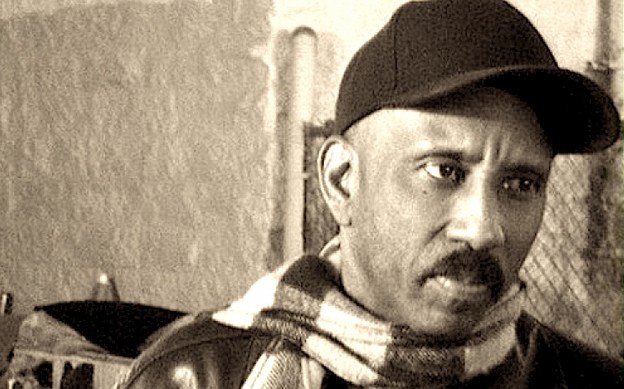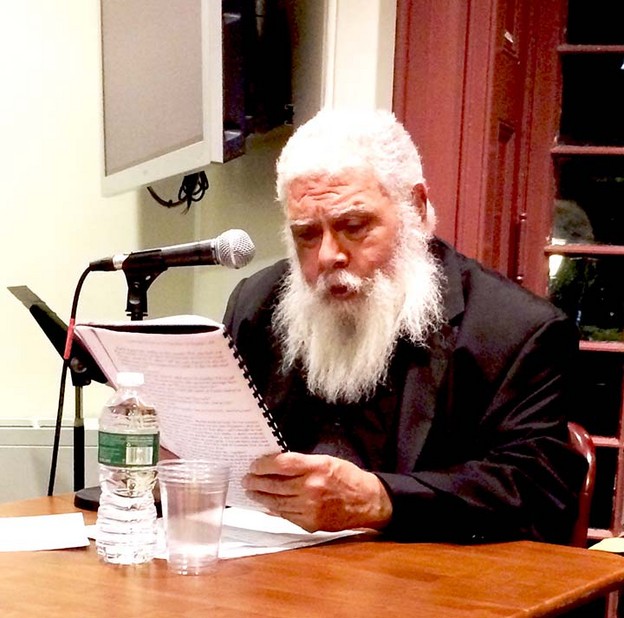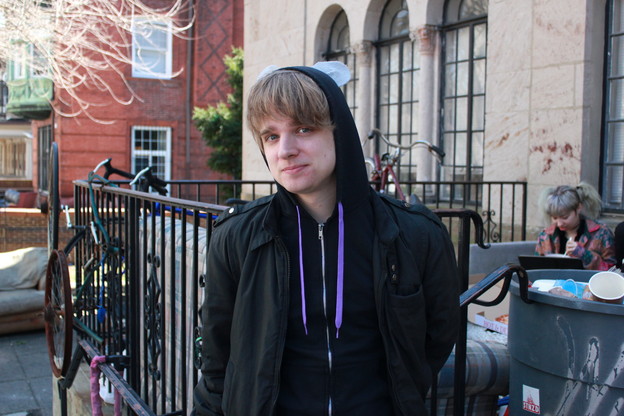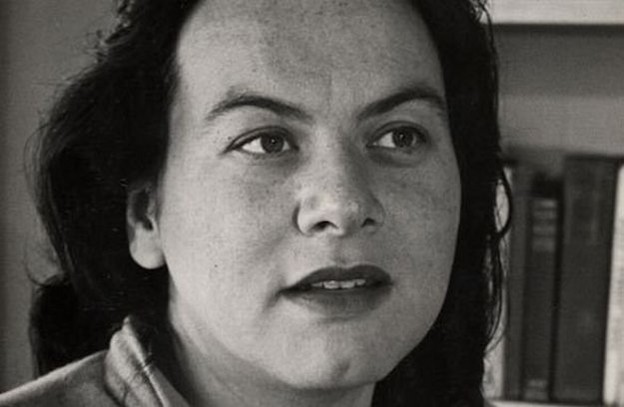|
|
Posted 4/1/2014 (link)
 As promised, we move right along to bring you episodes #288 through #295 of the excellent Cross Cultural Poetics series, hosted by Leonard Schwartz and broadcast from radio station KAOS 89.3 FM in Olympia.
We begin with episode #288, starring prolific composer Nico Muhly, who breaks down his comedic approach to performance, his new, full-length composition Drones, his opera Two Boys that was commissioned by and performed at the Metropolitan Opera, and a live concert he gave at iconic West Village venue (Le) Poisson Rouge. Next up, we have poet Johanna Drucker calling from LA to discuss her retrospective book and exhibit at Evergreen State College, Druckworks, 1972–2012 (Epicenter), that spans 40 years of the poet's writings, images and other selected pieces. Episode #290 brings poet LaTasha N. Nevada Diggs to the program, where she delves into the origins of her linguistically — and typographically — quirky book of poems, TwERK from Belladonna* Books and delivers a sensational reading of some of the pieces therein.
The next two episodes, #291 and #292, feature veteran CCP guest and novelist Russell Banks discussing and reading from his latest two books, out now from HarperCollins: the fist, a collection of short stories titled A Permanent Member of the Family; the second, a novel depicting a compellingly humanized portrait of registered sex offenders called Lost Memory of Skin. In #293, yet another returning author, Gillian Conoley, talks about her latest text, an expansive, haunting work titled Peace (Omnidawn). Conoley opens by reading a poem inspired by the shooting of former Arizona Rep. Gabrielle Giffords in 2011.
We then have an interview with poet/translator Eugene Ostashevsky, in which the author discusses the underground Russian absurdist poet, Alexander Vvedensky, whose literature forms the subject of Ostashevsky's recent joint translation project with Matvei Yankelevich, An Invitation for Me to Think (NYRB/Poets), and even finds an echo in the radical politics of contemporary protest group Pussy Riot. Ending on a theatrical note, we bring our latest collection of programs to a close with #295, featuring actress and singer Arielle Jacobs discussing her performance in Sotto Voce, the recently debuted play by Pultizer Prize-winning playwright, Nilo Cruz.
Stay tuned for more scintillating programming from Cross Cultural Poetics, featured on PennSound Daily.
— Sharon Margolis
Posted 4/7/2014 (link)
 Just last fall we announced that the one and only John Richetti had completed a new set of recordings of the Cavalier Poets for our site, and today, we have another new and impressive offering from the UPenn professor emeritus: a selection of "102 Favorite Poems, Good for Memorizing."
This diverse set spans both styles and centuries, covering both historic poets Richetti has read in previous sessions and more contemporary poets represented elsewhere in the PennSound archives. There's also a startling array of poets making their first appearance on the site, and while the primary goal of this set is the simple enjoyment of classic poems, it goes without saying that the pedagogical usefulness of these recordings — from elementary school up to the college level — is immense. Some of the many poets you'll find here: Matthew Arnold, Elizabeth Bishop, Robert Browning, Lewis Carroll, e.e. cummings, Emily Dickinson, Robert Frost, Gerard Manley Hopkins, A.E. Housman, Langston Hughes, John Keats, Ogden Nash, Edgar Allan Poe, William Shakespeare, Percy Shelley, Dylan Thomas, Walt Whitman, William Wordsworth, and William Butler Yeats.
To start exploring, click here, and don't forget to explore the full array of offerings on our PennSound Classics homepage.
Posted 4/8/2014 (link)
 Today saw the release of the landmark seventy-fifth episode in the PoemTalk Podcast series — an exploration of Will Alexander's poem, "Complete Hibernation," which was first published in Zen Monster before appearing in the 2011 collection, Compression & Purity. For this program, host Al Filreis was joined by panelists Tracie Morris, Kristen Gallagher, and Michael Magee.
Here's how Filreis starts his write-up of this episode on the PoemTalk blog: "The group began by discussing the poem's relationship to the Ellisonian strategy (or condition) of invisibility, in which one 'ingest[s] ... a blackened pre-existence' through a glaring, nine-sun-sized brightness while maintaining the feeling that 'Those who glance about me / ... cannot know me.' Its poetics — or 'galvanics' — presents a speaker residing in 'a pre-cognitive rotation' in an 'invisible tremor' yet made of a complex compound, and 'aloof' because of such 'interior compounding.' Mike Magee observes that Alexander is attempting to locate the speaker 'in an other-wordly space,' possibly inside the sun, the ur-source of our light. Tracie Morris adds that magic (including sleight of hand) is about dispersing light, teaching us the misdirection of seeing, 'making you distracted by not seeing what is in front of you.' For Kristen Gallagher, all during the discussion, Alexander's interest in surrealist writing practice seemed not just important to our following, or not following, the words of the poem, but helpfully connects with the magic of distracted vision Tracie sees in misdirected (in)visibility." You can read the rest of his introduction on Jacket2.
PoemTalk is a co-production of PennSound, the Kelly Writers House, Jacket2 and the Poetry Foundation. If you're interested in more information on the series or want to hear our archives of previous episodes, please visit the PoemTalk blog, and don't forget that you can subscribe to the series through the iTunes music store.
Posted 4/15/2014 (link)
 For the last month or so, Amy Catanzano has been writing a fascinating series of Jacket2 commentaries on "Quantum Poetics" that are well worth your attention, and today we're highlighting something else new and wonderful from Catanzano — a group of new recordings from Lynn Book, made at Wake Forest University last November. Here's Catanzano's description of the events:
Transmedia artist Lynn Book performed Kurt Schwitters' Ursonate (1922) in the Charlotte and Philip Hanes Arts Gallery at Wake Forest University in North Carolina on November 5, 2013. This performance marks the rare occasion of a woman publicly performing Schwitters' sound poem, first performed by Book in 1984 at Chicago Filmmakers and more recently at Roulette in New York, though never recorded until now. She is an associate teaching professor and associate director at Wake Forest teaching interdisciplinary creativity and developing projects for the Program of Innovation, Creativity and Entrepreneurship. She is also a graduate advisor for Transart Institute, an international program in contemporary arts practice. Her performance of the Ursonate was part of the Letterforming exhibition, curated by Hanes Art Gallery Director Paul Bright and Assistant Director Marcus Keely. Book's performance was first introduced by Paul Bright, who discusses dada and Schwitters' stake in hybridity as an artist. Amy Catanzano, who serves as poet-in-residence, an assistant professor, and director of the Creative Writing Program at Wake Forest, then discusses the Ursonate in relation to historical and contemporary movements in poetry and introduces Lynn Book to the audience. Lynn Book's Performance Art students participated in parts of the performance from the audience. The Letterforming exhibition and this performance was sponsored by Wake Forest's Humanities Institute, Department of English, Program in Interdisciplinary Studies, Writing Program, and Interdisciplinary Performance and the Liberal Arts Center.
In addition to Book's performance, we also have two recordings from Book and Catanzano's interview by David Ford for NPR News and Triad Arts on 88.5 WFDD-FM several days earlier: a formal twelve-minute segment that appeared on the radio and a post-interview conversation running twice as long. To listen to all of these fascinating recordings, click on the title above.
Posted 4/17/2014 (link)
 In anticipation of Rae Armantrout's April 28–29 visit as the last of this year's Kelly Writers House Fellows (following Buzz Bissinger and T.C. Boyle), we've segmented several vintage recordings from the poet.
First up, we have a Segue Series reading from its original home, the Ear Inn, recorded on April 14, 1979, when Armantrout read alongside Bernard Welt. Her twenty-four minute set, originally broken into two segments, is now available as thirty-three individual tracks, including the poems, "Natural History," "You Float," "Signs," "Generation," "Textron," "Vice," "Xenophobia," "Anti-Short Story," and "Special Theory of Relativity."
Next, there's Armantrout's half-hour reading from January 16, 1983 — she delivered a talk on "Silence" on the same day, though the location is unknown — which includes thirty poems, many overlapping with the aforementioned Segue recording. Some titles unique to this set: "Dark," "Postcards," "Admission," "Compound," "Secretly," "Precedence," "Round," "Atmospheric," and "The Music."
You'll find these recordings and a great many more on PennSound's Rae Armantrout author page. For more information on the poet's upcoming Fellows visit, click here.
Posted 4/21/2014 (link)
 This last full month of programming at the Writers House has been a busy one, and no day was busier than Friday, April 11th, when we played host to "The Motion of Light", a day-long "Celebrat[ion] of Samuel R. Delaney's Performative Poetics." As part of the proceedings, our own Charles Bernstein joined Delaney for a conversation as part of his radio series, Close Listening, which is now available for your listening pleasure. Here's Bernstein's write-up of the program for Jacket2:
"Samuel R. Delany talks with Charles Bernstein about genres, sex, and dyslexia in this wide-ranging conversation with the polymathic author. Delany addresses the role of fantasy and the bounds of imagination in his works and rebuts assumptions about the nature of genre writing.
Samuel R. Delany, Chip Delany to his friends, is an American author, professor, and literary critic. His work includes fiction, memoir, criticism, and essays on sexuality and society. After winning four Nebula awards and two Hugo awards over the course of his career, Delany was inducted by the Science Fiction and Fantasy Hall of Fame in 2002. Since January 2001, he has been a professor of English and Creative Writing at Temple University in Philadelphia. For a short time before that he was a core faculty member of the UB Poetics Program."
You can listen to this thirty-eight minute program on PennSound's Samuel R. Delaney author page, which is also home to a pair of readings from the SUNY-Buffalo, a 2007 Kelly Writers House celebration of Hart Crane, and a recording of Delaney's 1967 radio drama, The Star-Pit.
Posted 4/23/2014 (link)
 The latest installment of Stephen McLaughlin's Jacket2 podcast series, Into the Field, has just been posted. In this program, which runs nearly an hour in length, McLaughlin interviews Steve Roggenbuck and showcases his writing.
Steve Roggenbuck is a 26-year-old Internet poet from rural Michigan. He has spent the last several years giving readings and talks all over the country, sleeping on couches, selling books and t-shirts, making thousands of friends. His full-length collections are CRUNK JUICE (2012) and IF U DONT LOVE THE MOON YOUR AN ASS HOLE (2013), both released in the public domain and available at steveroggenbuck.com. He recently founded Boost House, a publishing collective and actual house in Brunswick, Maine. Here's how McLaughlin introduces him to start the podcast: "Steve Roggenbuck is a force — he has attained a level of fame for his poetry that most of us can only dream of — and he's done it in a new way, really completely through an online following. He borrows heavily from meme culture, he's made a lot of image macros, a lot of his work is really custom-tailored for resharing on Tumblr, and through these strategies he's opened up vast new audiences. He has a lot of really, really young fans — fans who probably would not have heard of PennSound or Jacket2, who wouldn't normally listen to an interview series like this — which is an amazing accomplishment."
Posted 4/25/2014 (link)
 If you're a fan of Muriel Rukeyser, we've got exciting new additions to both PennSound and Jacket2 this week that you'll want to check out.
First, here at PennSound, we've recently added a 1944 recording of the poet reading excerpts from "Letter to the Front" — specifically sections 1, 3, and 10 — which comes to us courtesy of Harvard's Woodberry Poetry Room. This four-minute MP3 joins an extensive collection of recordings spanning thirty-three years that you'll find on our Rukeyser author page.
And over at Jacket2, we recently published a stellar new article by Susan Briante, "Defacing the Monument: Rukeyser's Innovations in Docupoetics," which provides an in-depth look at the poet's early experiments in the form, and looks forwards to contemporary authors working under her influence, including Mark Nowak, Brenda Coultas, and Kaia Sand. Here's how she opens the piece:
"In 1936, just a year after winning the Yale Younger Poet's Prize, the twenty-two-year-old Muriel Rukeyser arrived in Gauley Bridge, West Virginia, the site of one of the worst industrial disasters in United States history, to work on her next poetry project. That same year The Plow that Broke the Plains was introducing American moviegoers to the documentary film; actors and writers working for the federal Living Newspaper Project were performing documentary theater in the streets; John Steinbeck was finishing The Grapes of Wrath, inspired by a newspaper story he had written a few years before; and another winner of the Yale Younger Poets Prize, James Agee, was traveling through rural Alabama on assignment from Fortune magazine to begin a book on tenant farmers that would change the shape of documentary forever. Rukeyser, too, would leave her mark on documentary with her groundbreaking series of poems inspired by the events in Gauley Bridge, 'The Book of the Dead.' Published in her 1938 collection US 1, the work was wrought from congressional testimony, interviews with survivors, quotations from the Egyptian Book of the Dead and Paradise Lost, and chronicles of West Virginia history."
To continue reading, click here.
Posted 4/28/2014 (link)
Posted 4/29/2014 (link)

At PennSound's home base here in the Middle Atlantic of the U.S., the PennSound staff is enjoying a much-belated spring. So we decided to offer a vernal sampling from our archive:
1. William Carlos Williams, "Spring Strains" (1:09): MP3
2. Paul Blackburn, "It might as well be spring" (1:37): MP3
3. E. E. Cummings (read by John Richetti), "spring is like a perhaps hand" (0:53): MP3
4. Alan Davies, "Cold Spring" (22:15): MP3
5. Edwin Denby, "The Spring goes drifting, angel of deceit" (1:03): MP3
6. Jeffrey Robinson reading "Ode: Composed on A May Morning" by William Wordsworth; followed by his own "Vernal Song of Blithe May after William Wordworth"; an excerpt from Wordworth's "The Triad"; his own "Poem on the Letter 'A'" (6:29): MP3
7. John Ashbery, "April Galleons" (4:08): MP3
8. Hannah Weiner, from "May from the Journal in June" — Hannah Weiner, poet and reader; Sharon Mattlin & Rochelle Kraut, readers (6:12): MP3
9. Tom Leonard, "June the Second" (1:06): MP3
10. Philip Whalen, "Japanese Tea Garden Golden Gate Park in Spring" (0:45): MP3
11. Fiona Templeton, from Medea on the Argo, "Medea wants a child in spring" (1:03): MP3
|
PennSound Daily archive
2023
2022
2021
2020
2019
2018
2017
2016
2015
2014
2013
2012
2011
2010
2009
2008
2007
|









